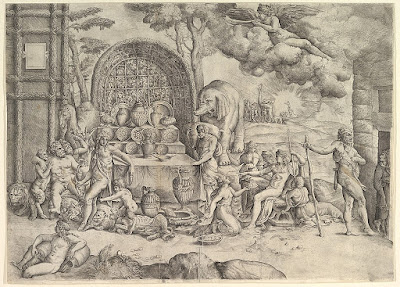I arrived at the old and beaten town with hopes of resting myself for the coming weeks. However, I noticed that something was terribly wrong. The city seemed almost deserted. There were no shops open and there were no children running around in the streets. I came across an older woman and asked her what had become of this once lively town. She told me that there was a pack of giants that had been terrorizing the town for some months now. Every day, one giant would come to the town and demand a tribute from the townsfolk. Each tribute to the giants lessened the number of people in the town. The woman had already lost many of her children to this tribute. I knew I had to put an end to this ridiculous agreement. So, I gathered my supplies and headed out the next morning.
One of the giants arrived the next morning demanding a tribute. The people of the town obliged, and I used this as an opportunity to follow the giant. I stalked him back to his village of giants and lurked in the shadows until it was my time to strike. The nightfall soon came upon us, and I knew my opportunity was near. The band of giants had gathered together to prep their graciously gifted meal. They were enjoying themselves as they drank obscene amounts of wine and dined on the "catch" of the day. I noticed that their senses were dulling as they continued to engorge themselves. A small scuffle broke out between two of the giants as they were arguing over who deserved the last piece of meat. I knew this was my best time to strike, so I prepped my blade and spear.
I crept up behind two of the giants that were off in the distance completely dazed from the alcohol they had consumed. I disposed of them quickly and continued to the rest of the group sitting around the fire. The three giants sitting around the fire were a bit more aware of their surroundings, so I had to move quickly. I snuck up behind one and plunged my sword through his heart. The other two giants noticed what had happened in disbelief. I took my spear and hurled it at one of the giants who had just realized what was happening to his friends. The other giant began to charge at me and he readied his club to bash my skull. I swung myself onto his back and disposed of him like I had the rest. The two giants that had been fighting were now passed out from their recent exhaustion and had no clue what had just taken place. I finished them off and returned to the town. I freed the people of the horrors that were haunting them and went on my way to a new adventure.
(Tales of the Punjab by Flora Annie Steel from Victorian Publishers' Bookbindings. Source: Wikimedia Commons)
Author's Note: This story was based on one of the adventures of Raja Rasalu from the book Tales of the Punjab. Raja Rasalu was a hero to the people and he accomplished incredible feats of the strength as a man. However, he had abilities and gifts that no normal man would ever possess. Raja was also very cunning and confident. He always knew what to say and do. During this specific adventure, Raja came upon the city of Nila. He comes upon an older woman that tells Raja of the giants and their tribute from the city. The woman had lost six of her children to the giants and was about to lose her seventh. Rasalu knew he had to rectify the situation, so he took the place of the child that was supposed to be the tribute for the day. Rasalu marched for the giants home on his steed and quickly went to work. However, some of the giants did not believe that he was in fact Raja Rasalu. They gathered a stack of seven shields and stood behind them. Raja Rasalu, being the hero that he was, shot an arrow through all seven shields and all seven giants standing behind them. He tracked down the last giant and let her starve in a cave to death. I changed a few of these elements in my story, but I kept it mostly the same. One of the major changes was that I told it from a first-person perspective. I did leave out some of the details that I mentioned above because I found that it did not fit the first person narrative. Overall, the story that I told is fairly true to its source.
Bibliography: Raja Rasalu from Tales of the Punjab by Flora Annie Steel. Source: UnTextbook















